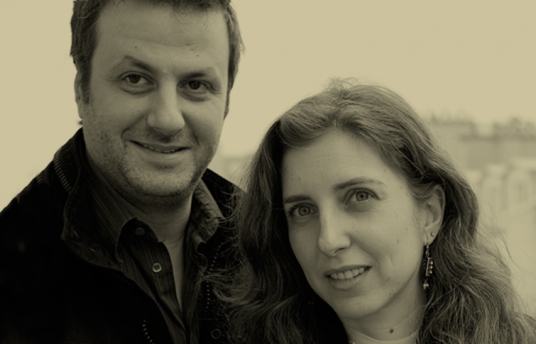أهل السينما: جومانة حاجي توما وخليل جريج
06 نوفمبر 2012

وصل صانعا الأفلام اللبنانيان جوانا حاجي توما وخليل جريج إلى الدوحة، تحضيراً للمشاركة في مهرجان الدوحة ترايبكا السينمائي، وأخبرانا عن فيلمهما الواثائقي “النادي اللبناني للصواريخ”. يستكشف هذا الفيلم البرنامج الفضائي اللبناني غير المعروف، و يعرض أيام 18، 21، و24 نوفمبر.
مؤسسة الدوحة للأفلام: ما هي فكرة الفيلم؟
جوانا: منذ 12 عاماً أخبرتني أختي قصة صاروخ أرسل من لبنان وأوشك على الوقوع على قبرص، وكان مشروعاً غير عسكري بل علمي.
أثار ذلك فضولنا خليل وأنا، ولم يتمكن أحد من إخبارنا عن الموضوع. بعد فترة عثرنا في أحد الكتب على طابع بريدي يظهر صاروخاً يحمل رسم العلم اللبناني، فبدأنا البحث.
خليل: استغرقنا وقتاً طويلاً في البحث، ففي البداية لم نتمكن من العثور على وثائق كثيرة. وبمساعدة بعض الأشخاص تمكنا من العثور على الوثائق كافة، لكن بعد انتهاء التصوير، وكانت بحوزة شخص خارج لبنان يدعى مانوغ مانوغيان الذي كان أستاذاً بجامعة هايغازيان وهو مؤسس مشروع النادي اللبناني للصواريخ. بعد اطلاعنا على كل تلك الوثائق، طرح هذا السؤال نفسه: لماذا نسي الجميع اليوم هذا الحدث، في حين شكّل في ما مضى عناويناً كبرى في الصحف وتم تصويره أيضاَ؟
مؤسسة الدوحة للأفلام: متى قررتما تحويل بحثكم إلى فيلم؟
جوانا: أثارتنا فكرة أن المشروع بدأ في جامعة صغيرة أرمنية في بداياتها مع أستاذ رياضيات يعمل مع طلابه وكان حلمهم أن يصنعوا أول صاروخ في العالم العربي وتحقق لهم ذلك. وأثارتنا فكرة أنه مشروع منسي وكان علينا أن نسأل – لماذا؟
مؤسسة الدوحة للأفلام: ما هي الصعوبات التي واجهتكم؟
خليل: حين بدأنا لم نكن نملك الكثير من الوثائق، وفجأة بتنا نعرف أين نبحث لا سيما بعد اكتمال سيرة المشروع. صرنا التواريخ والاتجاهات المحددة التي يجب البحث فيها، وهكذا تمكنا من العثور على كل الوثائق. ونحن كفنانين تعلمنا كيفية استخدام الأرشيف لبناء صورة.
الفيلم ينقسم إلى 4 أجزاء. الأول عن البحث والحاضر اليوم، ثم الماضي والقصة ثم نصل إلى إعادة صياغة هذه الصورة والحدث فنبني صاروخاً في إطار فني مع شارجه بيينالي ونمرره في أرجاء المدينة. وهذا الجزء يخولنا الحديث عن المستقبل، وحينها أنجزنا رسوماً متحركة مع غسان حلواني، تصورنا فيها لبنان عام 2025 لو لم يكن توقف مشروع الفضاء.
مؤسسة الدوحة للأفلام: كيف كانت ردة فعل مانوغ حين طلبتما منه مقابلته بشأن المشروع؟
جوانا: عثرنا على الموقع الالكتروني الخاص بمانوك مانوكيان فراسلناه. حين تكلمنا معه للمرة الأولى لم يتجاوب كثيراً، وسألنا لماذا نريد أن نصنع فيلماً عن الموضوع؟ ذهبنا إلى لوس أنجلوس، وكان هناك لقاء لجامعة هايغازيان هناك، وكان الجميع موجوداً، منهم مؤسس الجامعة ومانوغ وأحد الطلاب ورئيس الجامعة حالياً.
لم نكن نملك أي تمويل للفيلم، وقبل المنتجون أن يرسلونا إلى هناك. التقينا بمانوغ وتحدثنا لكنه لم يخبرنا بأن لديه وثائق وأفلام وصور كثيرة عن المشروع. ثم قررنا مقابلته مجدداً بعد أن يتوفر لدينا التمويل الكافي. ثم عدنا إلى تامبا وقابلناه في الجامعة، وحين بدأنا التصوير فتح فجأةً باباً يؤدي إلى مكتبه المليء بالصور والأفلام والوثائق وأراد أن يعطينا إياها، لكننا لم نرضى بتحمل هذه المسؤولية، فقضينا الليل ننسخ الصور وأعدنا النسخ الأصلية إليه.
خليل: في البداية كان مانوغ خائفاً من أن يساء فهم المشروع، فطلب منا أن نشدد أنه كان مشروعاً علمياً بحتاً. وحسب قوله لدى تقديمه الفيلم في مهرجان تورونتو، هو كان مراقباً من قبل السي آي إي والكي جي بي، لا سيما أنه كان قادراً في الستينات أن يصنع صاروخاً مداه 600 كلم. ظن أنه عاد مراقباً لا سيما بعد 11 أيلول. لقد خاف أن مراقبة المخابرات عادت بعد أحداث 11 سبتمبر.
مؤسسة الدوحة للأفلام: هل يقصد الفيلم أن يعكس الوضع السياسي الحالي في المنقطة؟
خليل:فيما كنا نصنع هذا الفيلم، عاد الحلم اليوم في المنطقة أكملها و عاد الناس ليحلموا بالتغيير وباستلام زمام مصيرهم ومستقبلهم، وهذا دفعنا للتركيز أكثر على هؤلاء الحالمين. عادت قدرة الحلم ظاهرة في الربيع العربي.
جوانا: لم يعد كثيرون في منطقتنا قادرون على أن يحلموا. أردنا أن نطرح تساؤلات: كيف نحلم اليوم، هل تغير حجم أحلامنا، هل تحجمت هذه الأحلام؟
مؤسسة الدوحة للأفلام: عملتما سوياً من قبل، كيف تصفان تعاونكما في العمل؟
جوانا:من الصعب شرح كيف نقوم بتقسيم العمل. لا أستطيع أن أحدد من يبدأ الكتابة ومن يخرج بالفكرة، وكيف تتطور الفكرة ومن يصوّر. لا نتقاسم الأدوار بهذه الطريقة. أحياناً لا نقتنع بأفكار بعضنا البعض، وحين يبدأ أحدنا بتطويرها قد يتحمس الآخر ويبدأ العمل مع الثاني ويصبح المشروع مشتركاً. إنه عمل جماعي له علاقة بحياتنا.
خليل: الأهم أننا لا نقوم بالتضحيات. إذا لم أكن مقتنعاً بفكرتها لا أعمل معها، ولا أخاف أن تغضب.
لشراء تذاكر لمشاهدة “نادي الصواريخ اللبناني” الذي يعرض في مهرجان الدوحة ترايبكا، زر هذه الصفحة:
www.dohafilminstitute.com/filmfestival/films/the-lebanese-rocket-society